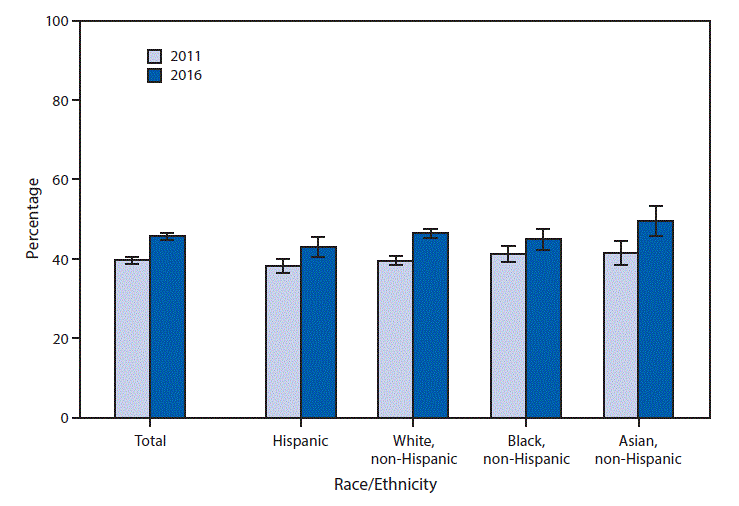QuickStats: Percentage* of Adults Aged 20–64 Years With a Fasting Test in the Past 12 Months for High Blood Sugar or Diabetes,† by Race/Ethnicity§ — National Health Interview Survey,¶ United States, 2011 and 2016
Weekly / December 1, 2017 / 66(47);1310

* With 95% confidence intervals shown with error bars.
† Based on a positive response to the question “Have you had a fasting test for high blood sugar or diabetes during the past 12 months?”
§ Categories shown are for Hispanic adults, who might be of any race or combination of races, and non-Hispanic adults who selected one racial group. Not all racial groups are shown. Total bar is based on all U.S. adults aged 20–64 years.
¶ Estimates are based on household interviews of a sample of the civilian, noninstitutionalized U.S. population and are derived from the National Health Interview Survey Sample Adult component.
The percentage of U.S. adults aged 20–64 years who had a fasting test for high blood sugar or diabetes in the past 12 months increased from 39.7% in 2011 to 45.7% in 2016. From 2011 to 2016, there was an increase in the percentage for all racial/ethnic groups examined: Hispanic (38.3% to 43.0%), non-Hispanic white (39.6% to 46.5%), non-Hispanic black (41.2% to 44.9%), and non-Hispanic Asian (41.5% to 49.6%) adults. In 2011, there was no statistically significant difference among the four groups examined, but in 2016, Hispanic adults were less likely than non-Hispanic white and non-Hispanic Asian adults to have had a fasting test, and non-Hispanic Asian adults were more likely than non-Hispanic black adults to have had one.
Source: National Health Interview Survey, 2011 and 2016 data. https://www.cdc.gov/nchs/nhis.htm.
Reported by: Michael E. Martinez, MPH, MHSA, bmd7@cdc.gov, 301-458-4758; Maria A. Villarroel, PhD, Emily P. Zammitti, MPH.
Suggested citation for this article: QuickStats: Percentage of Adults Aged 20–64 Years With a Fasting Test in the Past 12 Months for High Blood Sugar or Diabetes, by Race/Ethnicity — National Health Interview Survey, United States, 2011 and 2016. MMWR Morb Mortal Wkly Rep 2017;66:1310. DOI: http://dx.doi.org/10.15585/mmwr.mm6647a7.
MMWR and Morbidity and Mortality Weekly Report are service marks of the U.S. Department of Health and Human Services.
Use of trade names and commercial sources is for identification only and does not imply endorsement by the U.S. Department of
Health and Human Services.
References to non-CDC sites on the Internet are
provided as a service to MMWR readers and do not constitute or imply
endorsement of these organizations or their programs by CDC or the U.S.
Department of Health and Human Services. CDC is not responsible for the content
of pages found at these sites. URL addresses listed in MMWR were current as of
the date of publication.
All HTML versions of MMWR articles are generated from final proofs through an automated process. This conversion might result in character translation or format errors in the HTML version. Users are referred to the electronic PDF version (https://www.cdc.gov/mmwr) and/or the original MMWR paper copy for printable versions of official text, figures, and tables.
Questions or messages regarding errors in formatting should be addressed to mmwrq@cdc.gov.